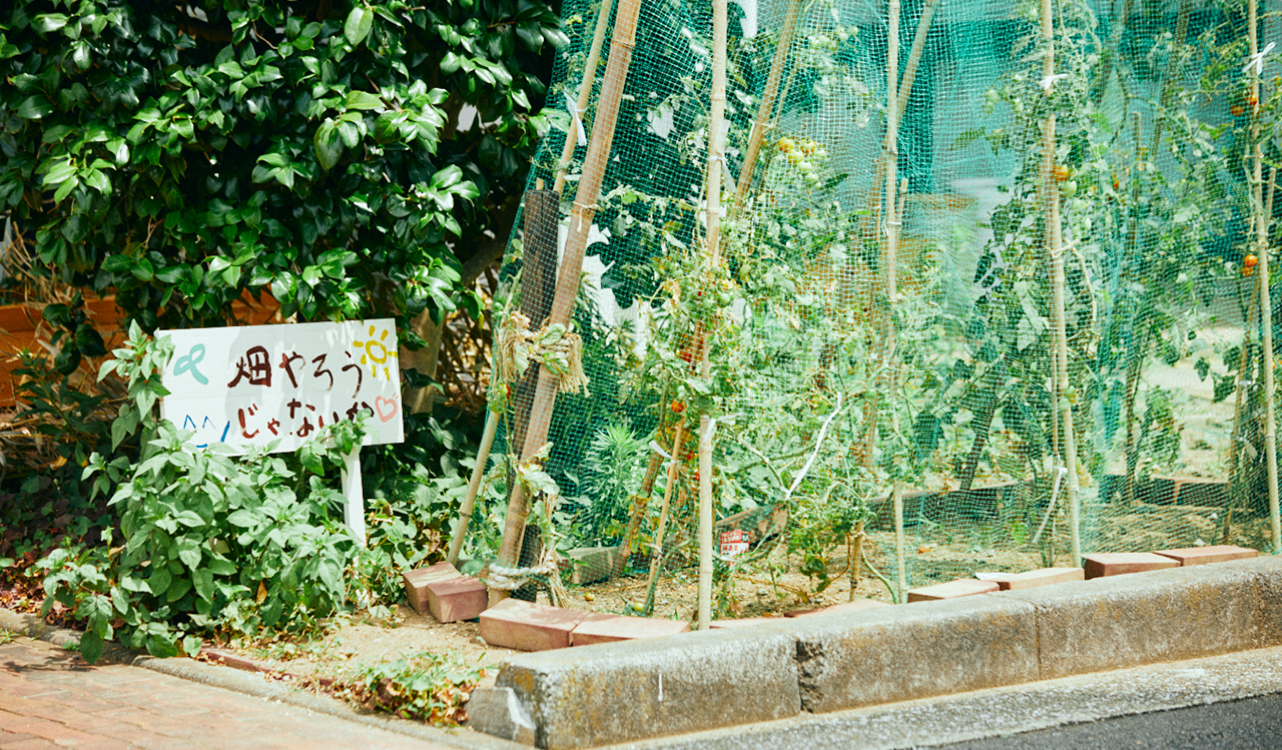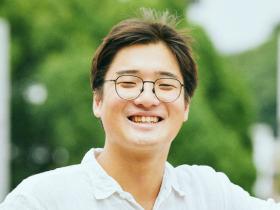Accepting all incongruities
“People say they can see the Hidaka Mountains in my background.” A presence that is broad and majestic, seamlessly blending into any setting, watching over the scene without feeling out of place. That’s the image people have of Taichi Yasuda, who is known for his openness. Beyond that, however, his strengths include a strong sense of conviction and agility, occasionally bringing incongruities to campus. Here we introduce Mr. Yasuda’s student life.


Taichi Yasuda
Third-year student Department of International Studies, Faculty of International Studies
Taichi Yasuda is originally from Hokkaido. He is one of three siblings, each with names deriving from nature-related words [his means “the great earth”]. While growing up, he enjoyed spending time with nature in a place surrounded by mountains. In primary and secondary school, he took part in agricultural activities such as harvesting potatoes, and at home, he worked in his garden and grew vegetables. Recently, he has been really into hot springs and saunas, where he can intentionally make time to “space out.” He is enrolled in Professor Shintaro Namioka’s seminar, where he studies political sociology.
It’s not what to be, it’s who to be
Being born and raised in Hokkaido, the ever-present mountain ranges were always visible from my classroom windows. The mountains seemed always to be there, watching over us, but they were a presence I never tired of; they always moved me.
As a high school student faced with taking college entrance exams, I wondered what criteria I should use to choose a college. At the time, the counselor who was helping me with my college entrance essays asked me, “What kind of person do you want to be?” Not what I wanted to be in the future, but who I wanted to be. There was something about that way of thinking that really clicked with me.
The answer I gave as a high school senior was, “I want to be the kind of person who understands the joys and sorrows of others.” To that end, I needed to understand the ideas of different people. My desire to study in an interdisciplinary manner, exposing myself to diverse disciplines including political science, peace studies, and economics, led me to enroll in Meiji Gakuin’s Department of International Studies.
I repeated those words on my first day, at our college entrance ceremony. The entrance ceremony for the Faculty of International Studies was held at the Yokohama campus chapel, and I spoke those words when the dean at the time asked if anyone had something they wanted to say. I found myself raising my hand and going up to the podium, where I said, “At the Faculty of International Studies, I want to become someone who can understand the joys and sorrows of others.” Reflecting on that today, I can’t believe I was able to suddenly stand up and say such a thing in front of a room full of strangers. Sometimes I don’t have a good sense of what people will think of me when I do a certain thing. I guess you could say I’m a little dense. As a result, however, that day someone came up to me and said, “Your words really moved me, let’s be friends,” leading me to make a new friend right away. Since joining the Department of International Studies, I’ve found that I enjoy such moments when I can express my opinions and receive reactions to them. How I envisioned myself as a high school senior has remained unchanged.

The incongruity of a field on campus
I grew up with ranching, rice farming, dairy farming, raising livestock, and agriculture. Perhaps that’s why I knew that what I wanted to do in college was something food-related.
Since before entering college, I have been interested in composting, the process of utilizing microorganisms to ferment and decompose food scraps, dead leaves, and other organic material into compost. The resulting compost can then be used in some way for resource circulation. I wanted to realize such a system to help create a recycling-oriented campus.
The result of that desire was the “Let’s Create a Field” project. As part of a seminar workshop I participated in as a second-year student, I heard a talk by a farmer in Yokohama’s Totsuka Ward. Some participating fourth-year students were interested in agriculture, and I was interested in composting. Using the compost we created for a field would perfectly match what we wanted to do, so together we applied for the Volunteer Fund Student Challenge, and with the Volunteer Center’s help we started work on that project. Even today, we are still growing tomatoes and taro in a field next to the Volunteer Center on the Yokohama Campus. Someone from the Maioka Park NPO Yatohito Mirai gave us advice for creating the field, so it also became a place for interacting with our local community.
There are still hurdles to overcome to make composting a reality, but I suddenly realized something while working on my Let’s Create a Field activities. Namely, that a field on campus creates a sense of incongruity. While fields are a familiar sight to me, they are not for many others. For some, it was their first time seeing tomatoes climb their supports as they grow. I think that even just seeing fields, stopping to see the process by which the food we eat every day is produced, plays a role in making us more aware of food and our environment.

The importance of awareness
In 2022, I was selected for the Volunteer Fund Student Challenge for an activity called “Inspire Food.” Naturally, food was the origin of this activity. My objective was to deepen and improve on-campus learning about food with a focus on two areas: food diversification and understanding food production processes.
Spending time in the Department of International Studies, I interacted with people from diverse religious and cultural backgrounds. During those interactions, I noticed that some people have limited choices in what they eat. For example, when interviewing and surveying people as part of our Inspire Food activities, issues such as allergies, veganism, and halal observation arose. I think diversity in a university setting is not just about accepting international students, and I wonder what diversity and globalization really mean. It was with that sense of incongruity in mind that we undertook these activities. Even so, it is difficult to suddenly introduce compliant diets, so I thought the first step was to make people aware of the situation.
I started an Instagram account, which we used to share vegan recipes and compile social issues related to food and food environments in easy-to-understand posts. We also created a product board for the cafeteria and created a game where players guess which items are vegan. I got the feeling that not many people were able to guess correctly, and such a lack of knowledge means diversity is not yet widespread. In that sense, I believe our activities successfully increased awareness of this issue. I don’t know if I directly contributed, but there are now Halal-certified dishes in the cafeteria and vegan food sold in the International Cafe, so it seems that food diversity is gradually progressing.
Regarding my other area of focus, understanding food production processes, I am trying to implement that through the Let’s Create a Field project. Growing food is a difficult, arduous task. Weeding and watering is necessary, of course, but beyond that we must also prune side shoots and observe the plants daily. There is value in eating food after learning about its production process, rather than just buying it at a supermarket, in that we can recognize its importance. Not only that, but the food is very delicious. It’s a time-consuming task, but I hope that by the time I graduate, I can leave my juniors with a better understanding of food production processes while introducing a composting system and creating a campus that is more aware of environmental issues.

Leveraging “not worrying”
I think my reason for being at Meiji Gakuin is wanting to be a student in the Department of International Studies at the Yokohama campus. There have always been many things I wanted to achieve during my college life, and I am the type of person who is unafraid to say them out loud. Some people accept them, and others have opposing opinions. Regardless, I have had opportunities to speak and get reactions, so the environment at the Faculty of International Studies has been a very comfortable one for me.
I tend not to worry about things, but of course there are people who are the exact opposite. As a broad theme, I spend my days thinking about how we can all live well. Even in college, some people find it difficult to talk to strangers, raise their hands to ask questions in class, or take courses in an unfamiliar language. All of these can be hurdles. I want to help create an atmosphere and environment at the university that does not make people feel that way, grandiose though that may sound. To that end, I first want to become someone who can successfully convey my thoughts and move others.
With that in mind, I will continue to deepen my knowledge of political sociology in my International Studies seminar, and I am also considering entering graduate school. In the field of political sociology, to complete my dissertation I want to learn about differences between various laws and systems in Japan and other countries, as well as the cultural backgrounds of those countries. If my paper catches someone’s attention, and if society ends up better off for it, then I feel I would have taken a step closer to becoming “a person who can understand the joys and sorrows of others,” as I spoke of at my entrance ceremony.

